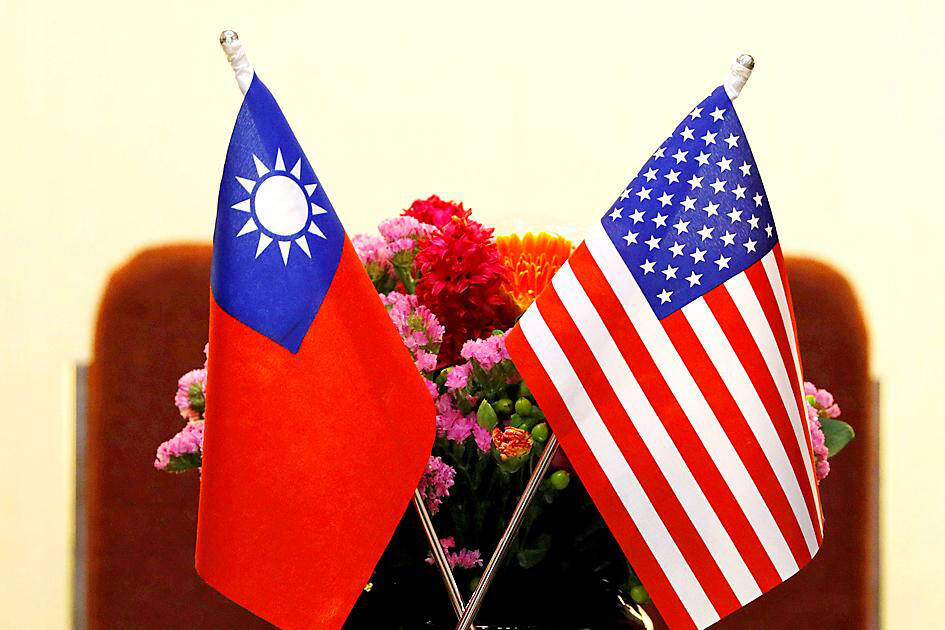The possibility of producing US arms in Taiwan might be discussed at the US-Taiwan Defense Industry Conference next month, a researcher said yesterday.
The conference would be held from Sept. 22 to 24 in Philadelphia, and the issue of repairing and manufacturing US arms and parts might be discussed, said Shu Hsiao-huang (舒孝煌), a researcher at the government-funded think tank Institute for National Defense and Security Research.
“Taiwanese factories are definitely capable of doing arms repairs, but they would need to strengthen management before they could obtain authorization,” he said.

Photo: Reuters
The military has a lot of equipment in its arsenal that needs to be sent to the US for repairs, but that process takes time, and some older parts are no longer manufactured, he said.
“Many people have been discussing whether cooperation between manufacturers in the US and Taiwan could be improved so that some of those parts could be manufactured in Taiwan,” he said. “It is possible that through discussion, the Armaments Bureau, the Chungshan Institute of Science and Technology, or Taiwanese manufacturers could be permitted to produce some components.”
However, since the issue involves intellectual property rights it would require authorization from the US or companies there, he said.
Institute for National Defense and Security Research fellow Su Tzu-yun (蘇紫雲) said that US procurement regulations stipulate patent and confidentiality rights, and that the US typically makes procurement-related decisions centrally and on a case-by-case basis.
Citing an example of a possible arrangement, Su said that the US might allow parts for the Lockheed P-3 Orion submarine hunter to be produced in Taiwan, or might obtain Japanese parts for the aircraft to sell them to Taiwan.
At the first session of next month’s conference, the two sides would discuss threats ahead the US’ defense industry, while the last three sessions would cover talks on how the industry could effectively respond to global situations, Taiwan-US defense industry cooperation model and arms sales to Taiwan, he said.
“One of the key requirements for the US to authorize production of parts in Taiwan would be for companies to strengthen their management of information security to prevent technology from being leaked to China or a third party,” he said.
Taiwan would also need to establish a third-party certification platform to vet manufacturers based on transparency and other factors, he said.
“The Ministry of National Defense should also calculate the service life of old equipment and provide manufacturers with complete procurement demand planning so that they would be willing to produce parts that are obsolete or nearing obsoletion,” he said.

The first global hotel Keys Selection by the Michelin Guide includes four hotels in Taiwan, Michelin announced yesterday. All four received the “Michelin One Key,” indicating guests are to experience a “very special stay” at any of the locations as the establishments are “a true gem with personality. Service always goes the extra mile, and the hotel provides much more than others in its price range.” Of the four hotels, three are located in Taipei and one in Taichung. In Taipei, the One Key accolades were awarded to the Capella Taipei, Kimpton Da An Taipei and Mandarin Oriental Taipei. Capella Taipei was described by

The Taichung District Court yesterday confirmed its final ruling that the marriage between teenage heir Lai (賴) and a man surnamed Hsia (夏) was legally invalid, preventing Hsia from inheriting Lai’s NT$500 million (US$16.37 million) estate. The court confirmed that Hsia chose not to appeal the civil judgement after the court handed down its ruling in June, making the decision final. In the June ruling, the court said that Lai, 18, and Hsia, 26, showed “no mutual admiration before the marriage” and that their interactions were “distant and unfamiliar.” The judge concluded that the couple lacked the “true intention of

EVA Airways today confirmed the death of a flight attendant on Saturday upon their return to Taiwan and said an internal investigation has been launched, as criticism mounted over a social media post accusing the airline of failing to offer sufficient employee protections. According to the post, the flight attendant complained of feeling sick on board a flight, but was unable to take sick leave or access medical care. The crew member allegedly did not receive assistance from the chief purser, who failed to heed their requests for medical attention or call an ambulance once the flight landed, the post said. As sick

INDUSTRY: Beijing’s latest export measures go beyond targeting the US and would likely affect any country that uses Chinese rare earths or related tech, an academic said Taiwanese industries could face significant disruption from China’s newly tightened export controls on rare earth elements, as much of Taiwan’s supply indirectly depends on Chinese materials processed in Japan, a local expert said yesterday. Kristy Hsu (徐遵慈), director of the Taiwan ASEAN Studies Center at the Chung-Hua Institution for Economic Research, said that China’s latest export measures go far beyond targeting the US and would likely affect any country that uses Chinese rare earths or related technologies. With Japan and Southeast Asian countries among those expected to be hit, Taiwan could feel the impact through its reliance on Japanese-made semi-finished products and